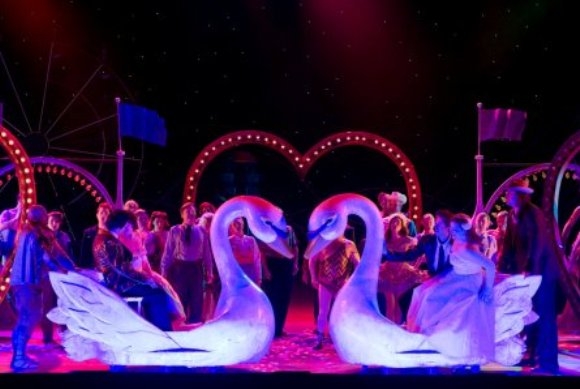Così fan tutte (London Coliseum)
All the fun of the fair at English National Opera as Mozart’s amorous merry-go-round returns in a sparkling new production

© Mike Hoban
Funny, fast and farcical – and that’s only the overture. In Phelim McDermott‘s new production of Così fan tutte for English National Opera (in collaboration with Improbable) there’s more comic business before a word has been sung than you’ll see in most complete performances of this, the third and (to modern sensibilities) least politically correct of Mozart’s three collaborations with Lorenzo Da Ponte.
Purists will have apoplexy when they hear the Coliseum audience laugh and clap its collective way across Mozart’s filigree introduction, particularly with the score played as brightly and idiomatically as it is here by the ENO Orchestra under Ryan Wigglesworth, but even they will surely have to admire McDermott’s chutzpah. Da Ponte’s tale of two suitors who test their lovers’ fidelity to its limit has all the brackishness of a practical joke – amusing to the perpetrators, calvary to the victims – and its inherent cruelty needs a director’s help to make it palatable. It gets plenty here.
Early on, when the scheming Don Alfonso refills hero Guglielmo’s glass while he’s not looking, we understand that the men are being hoodwinked by this sinister Iago figure just as much as the women. When they go too far with their misbehaviour he goads them beyond their own intentions, leading to some lewd behaviour in the Tunnel of Love.
For McDermott has taken us for a ride – to the funfair. More specifically to Coney Island, New York, c.1957, where Roderick Williams‘s lurid spiv of a Don Alfonso feels right at home and designer Tom Pye has conjured up the most spectacular evocation of a lost epoque – exquisitely lit by Paule Constable. In keeping with those bygone times there’s an ever-present human sideshow to be gawped at: bearded ladies, sword swallowers, duped lovers… It’s compelling and discomfiting at the same time – exactly as it should be.
McDermott’s freewheeling visual approach is endlessly inventive (although we’ve probably seen enough birds on sticks for the time being) and constantly symbolic. The ever-present helter-skelter, rollercoaster and ferris wheel, for instance, remind us that nothing in life runs smoothly, least of all the course of true love.
ENO’s Così fan tutte is that rare beast, a comic opera production that’s actually laugh-out-loud funny. It will probably come fully into its own at its first revival, because a couple of puzzling casting decisions affected the six-strong solo group. Surely Roderick Williams’s attractive baritone and youthful mien would be better suited to Guglielmo than Don Alfonso? He was certainly suave but rarely sinister. As for Randall Bills as Ferrando, an attack (I assume) of first-night nerves shredded his impact. A tenor whose voice tightens under pressure is a poor fit for Mozart, and it made for uncomfortable listening.
Unusually for Così, it’s the women who were the funnier. Some deliciously timed reactions to the advances of the disguised admirers were equalled only by their rapt singing throughout the evening. One might wish for a touch more sweetness to their Act One trio (with Don Alfonso) "Soave sia il vento", but both Kate Valentine as the tortured Fiordiligi and Christine Rice as the more pliant Dorabella were a delight.
As it turned out, the absence through technical indisposition of surtitles mattered not a jot, for the wit of Jeremy Sams's translation shone through in the clear diction of all six singers. Mary Bevan was a feistily funny Despina while Marcus Farnsworth was robust and vocally affecting in Guglielmo's faux-dalliance with Dorabella – and quite hilarious in his double-act with Bills when their US Navy uniforms gave way to Fonz-like quiffs and leather jackets. Happy days.












